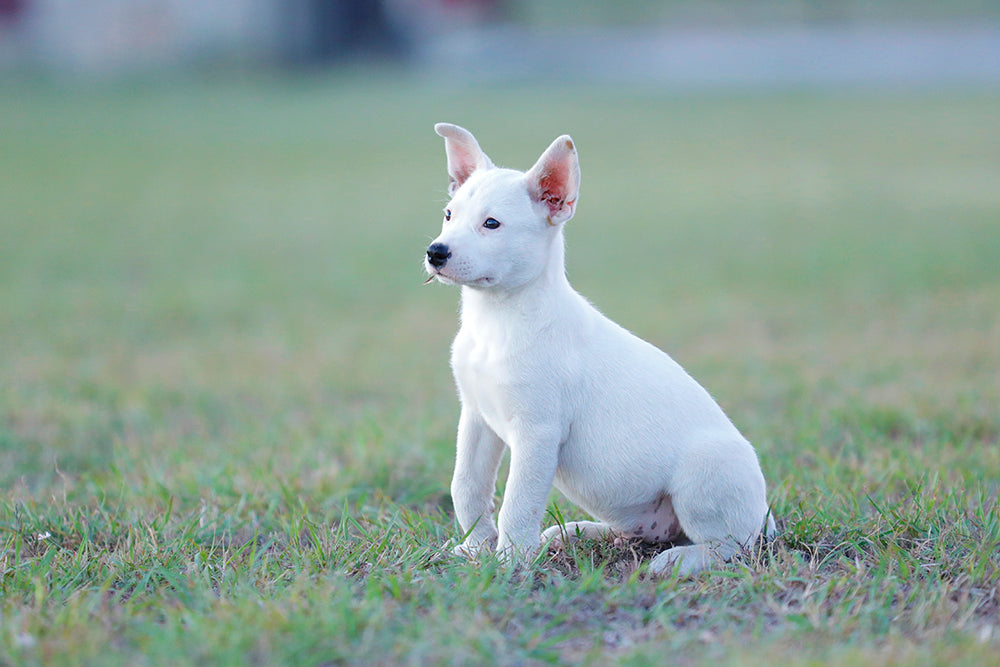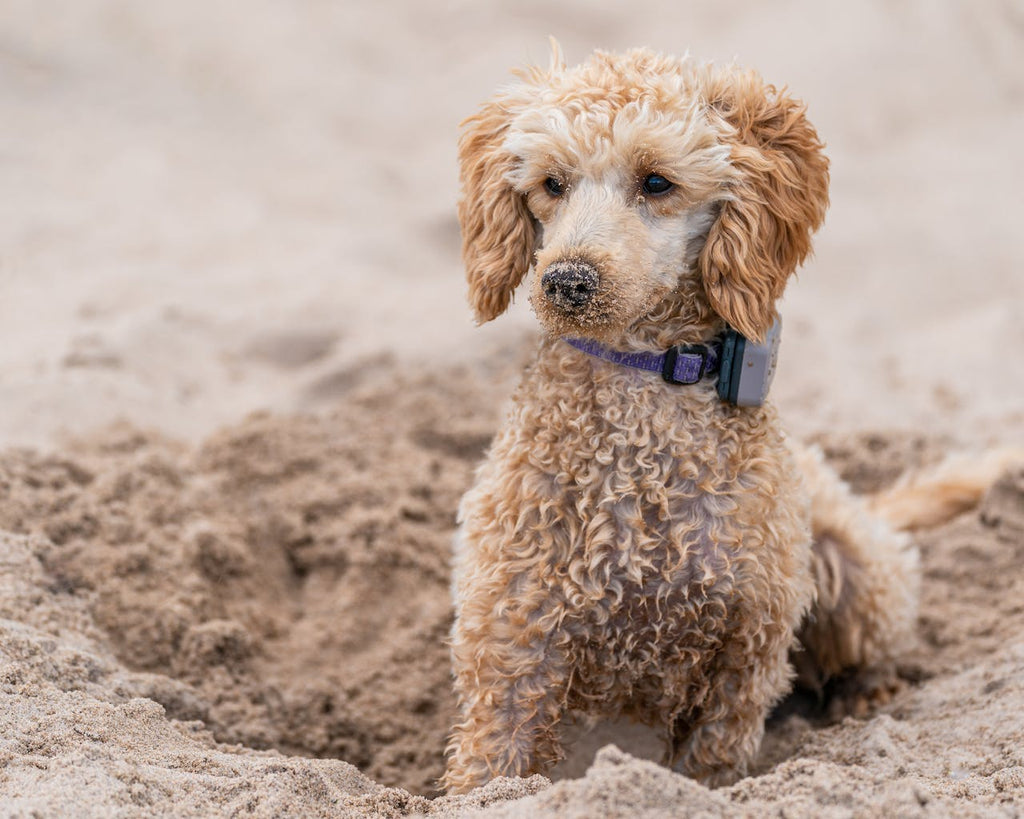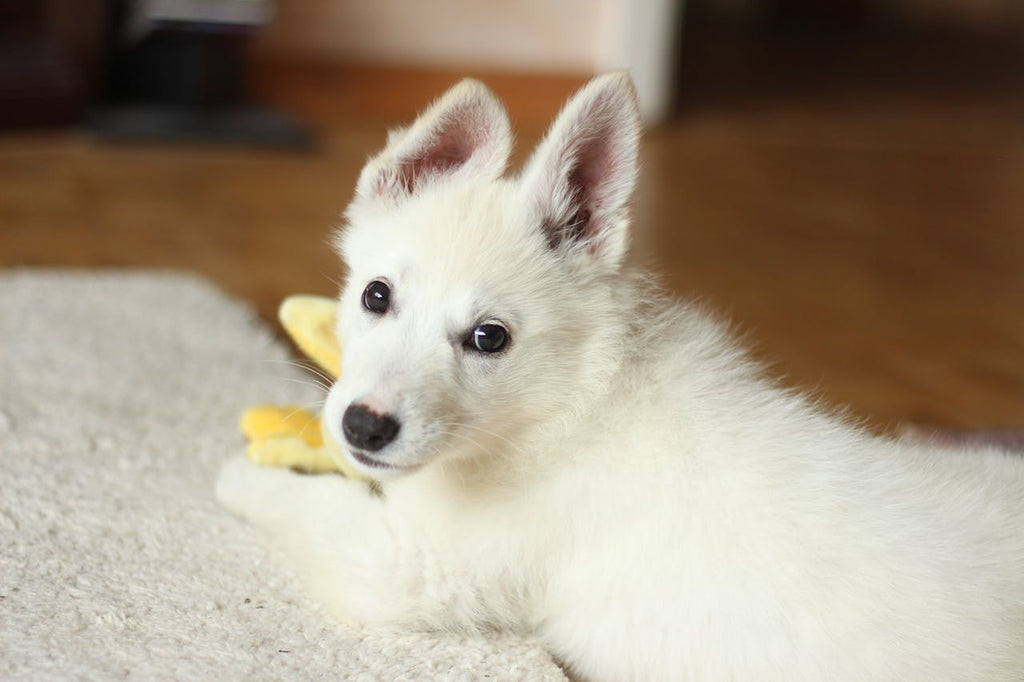
Mastering the Art of Potty Training a Puppy in 7 Days

So, you've just brought home that cute, little furball? Congratulations!
There you are, gazing down at those big, adorable eyes of your new furry friend. You've prepped with toys, got the comfiest bed, and even found the perfect name.
But now comes a slightly trickier challenge that every puppy parent must face: Potty Training.
Don't worry, it might sound daunting, but with the right guidance, patience, and a dash of humor, you and your pup will sail through this rite of passage.
Join us as we unfold the ins and outs, tips and tricks, and the highs and lows of potty training your puppy!
Read More: Master Your Pup's Behavior in 5 Steps!
Why Potty Training a Puppy is So Important?
First, let's dive into the 'why'.
Potty training your puppy ensures a happy, hygienic home.
You save on cleaning time. And guess what? No more unexpected “surprises” on your favorite rug!
It's not just about cleanliness; it's about building a bond of understanding with your new best friend.
Getting Started: Understanding Your Puppy's Needs
In the world of potty training a puppy, timing is everything.
Puppies usually need to go after eating, waking up, or playing.
Watching for signs is key.

A sniffing, circling, or restless puppy? Time for a potty break.
Here's a tip. Set a routine. Just like human babies, puppies thrive on routines.
Feed, play, and take them out at the same times every day.
Consistency breeds success.
Choosing the Right Spot
It's not just when, but where. Select a specific spot outside.
This consistency helps them recognize where to go.
Always lead them to this spot during potty breaks and before you know it, they’ll head there on their own.
Praise, Praise, Praise!
Let’s get real, who doesn’t like a little appreciation?
Your puppy is no different.
Every time they do their business where they should, shower them with praise.
A simple “Good job!” works wonders. Maybe even a treat.
Positive reinforcement is the key.
Accidents Happen. Stay Calm.
It’s bound to happen. A puddle in the corner or a mess on the bed.
Stay calm, yelling won't help.
Instead, clean up and move on.
Remember, patience is your best friend here.
If you see them in the act, a simple “No” and guiding them to the right spot will do.
Over time, they’ll get it. And so will you.
The Road Ahead
Potty training a puppy is a journey.
In every journey there'll be ups and downs.
But the end result? An understanding between you and your fur baby that lasts a lifetime.
Keep your eyes on the prize.
Read More: How to Master Perfect Puppy Crate Training in 6 Steps
It’s not just about a clean house.
It’s about trust, understanding, and a bond that deepens with every tiny success.
The Importance of the Right Tools
When embarking on the adventure of potty training a puppy, having the right tools can make a world of difference.
It’s like building a house; the right equipment can make the process smoother.
Invest in Quality Training Pads
These are a lifesaver, especially for those rainy days or nighttime emergencies.
Choose ones with good absorption.
Place them near the door initially. This will signal to your pup that it's close to where they should be doing their business.
Over time, you can move these pads outside to create a seamless transition.
Cleaners and Enzyme Sprays
Accidents will happen. But it’s essential to clean them up effectively.
Why?

Puppies have a keen sense of smell.
If an area smells like their previous “accident,” they might think it's their new spot.
Enzyme sprays break down the odors ensuring no residues are left to attract them back to the same spot.
Potty Bells Can be a Game Changer
These are bells your puppy can learn to ring when they need to go out.
It’s a clear form of communication between you two.
Every time you take them out, encourage them to tap the bell.
And before long, you’ll hear a jingle when nature calls for your little one.
The Social Aspects of Potty Training
Ever think of potty training a puppy as a social exercise?
Well, in many ways, it is.
Introduce Them to Other Trained Dogs
Dogs learn a lot from their peers.
If a puppy sees another dog going potty outside, they might just follow suit.
It's peer pressure, but in a good way!
Engage with Puppy Playdates
Yes, it's as fun as it sounds!
Organizing playdates with other trained pups can not only socialize your puppy but also reinforce good habits.
When they see others doing their business outside, they're more inclined to do the same.
Join a Course on Potty Training a Puppy
Besides potty training, these classes teach various commands and good behaviors.
Being in a structured environment can accelerate the potty training process.
Plus, it's a fantastic way for both of you to make new friends.
Preparing for the Long Haul: Managing Expectations
Potty training a puppy is not a sprint; it's a marathon.
And like any long journey, it's essential to manage your expectations.
Every Puppy is Different
Just like humans, every puppy is unique.

While one might catch on in a week, another might take a month or more.
It’s vital to celebrate small victories along the way.
The Role of Diet in Potty Training
Believe it or not, what your puppy eats plays a significant role in their potty habits.
Tailoring their diet can assist in making the potty training journey smoother for both of you.
- Quality Over Quantity: A high-quality dog food ensures that your pup absorbs more nutrients, producing fewer, firmer stools. This not only makes cleanup easier but also means fewer potty breaks.
- Regular Feeding Times: By feeding your puppy at consistent times daily, you can predict when they'll need to go. This predictability is invaluable in setting up a successful potty schedule.
- Watch Out for Allergies: Some foods might upset your puppy’s tummy, leading to unpredictable bathroom habits. If you notice frequent or loose stools, consider consulting your vet about potential food sensitivities.
Potty Training in Special Circumstances
Life isn't always straightforward, and neither is potty training.
Here's how to navigate potty training in some unique scenarios.
- Apartment Living: Without easy access to a backyard, potty training a puppy in an apartment might seem daunting. Puppy pads become crucial here, as does establishing a routine. Ensure you take your puppy out first thing in the morning, after meals, post-playtime, and right before bed.
-
Inclement Weather: Rain, snow, or harsh sun can deter a puppy from wanting to go outside. But consistency is key. Protective gear, like puppy raincoats or booties, can make the experience more pleasant. Over time, your pup will get used to the elements. - Older Dogs: Think you can't teach an old dog new tricks? Think again. Older dogs can be potty trained, though it might take a tad longer. The approach remains the same: patience, consistency, and praise.
Dealing with Setbacks in Potty Training
Setbacks in potty training are as inevitable as the sunrise.
The key is not to get discouraged.
Understanding the potential reasons and how to address them will get you back on track.
- Changes in Environment: Moving homes, a new family member, or even rearranging furniture can unsettle your puppy. During such times, they might forget their potty manners. It's essential to reassure them and perhaps revisit some basic training steps.
- Overexcitement or Anxiety: Sometimes, a super excited pup or an anxious one might have an accident. Recognizing these triggers can help you preemptively handle the situation. For instance, if guests often excite your puppy, ensuring a potty break before their arrival can be a game-changer.
- Physical Health: Recurrent accidents might indicate an underlying health issue. Urinary tract infections, gastrointestinal troubles, or other ailments can cause incontinence. If you notice persistent irregularities, it's time to visit the vet.
Overcoming Common Challenges
Every puppy is unique, which means each one comes with its own set of potty training challenges.
Let’s tackle some common ones.
- Night-time Troubles: Puppies, like babies, have smaller bladders. This might mean nighttime accidents. Solution? Limit water intake in the evening and ensure a potty break right before bedtime. If your puppy whines in the middle of the night, it might be a potty alert. Quick action is key.
- Refusing to Go Outside: Some pups just don’t like the great outdoors. It could be the weather, unfamiliar sounds, or just plain stubbornness. Patience is key here. Stay with them outside, use encouraging words, and remember those praises when they finally do it.
- Multiple Accidents: If your puppy has frequent accidents, it might be more than just potty training issues. It's worth a visit to the vet to rule out any medical concerns.
In Conclusion
Look at you, taking on the challenge of potty training a puppy head-on!
With patience, consistency, and a sprinkle of love, your puppy will get there.
And trust us, the pride you'll feel watching them trot over to their designated potty spot? Absolutely unbeatable.
Thanks for joining us in this potty-training journey.
Remember, every puppy parent goes through it. And with this guide by your side, you're set up for success.
Want to go from puppy parent to dog-training dynamo? Our courses have all the tips, tricks, and expert advice you need. Sign up and start your journey to doggy excellence today!



